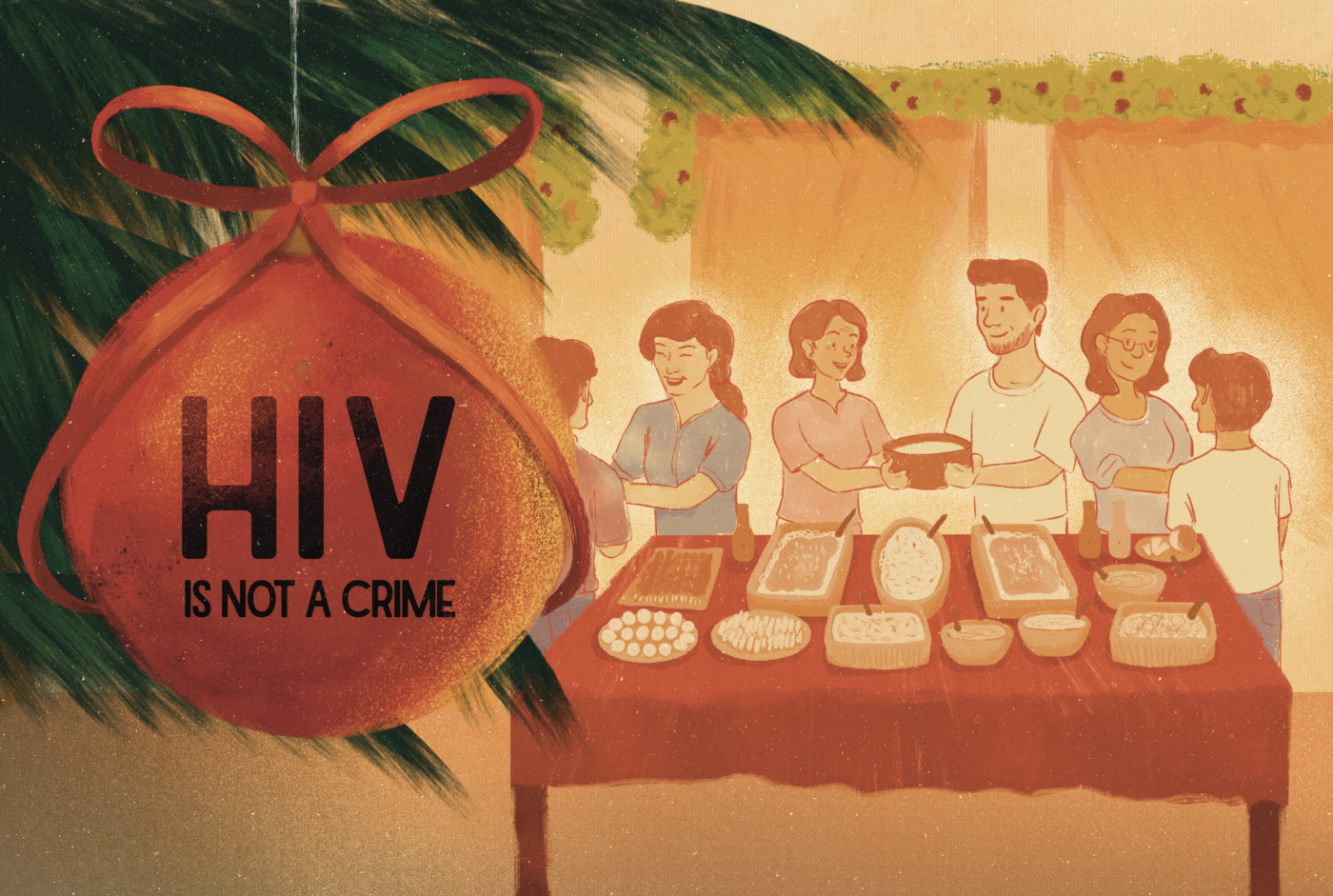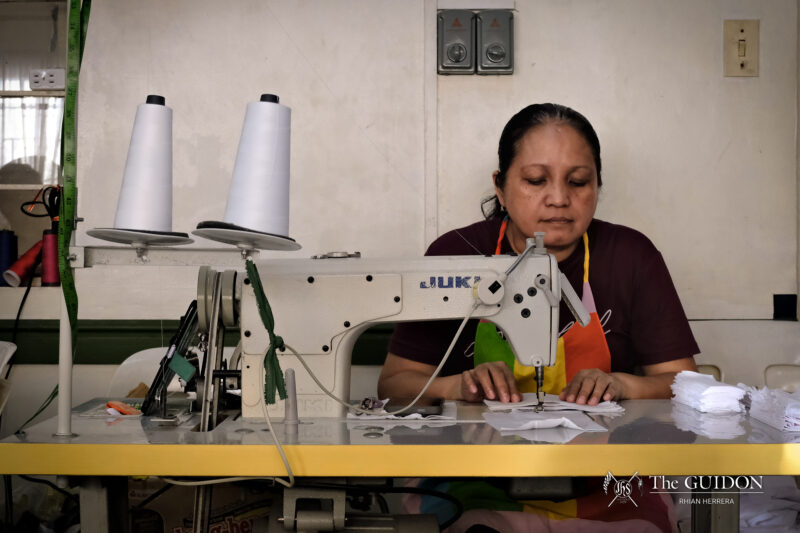Amid the twinkling lights and festive songs, the warmth of hope flickers brightest in the hearts of those celebrating Christmas within the colorful walls of HIV shelters.
THE HOLIDAYS are hallmarked as a season of familial celebrations. However, amid the laughter and cheers, the voices of those celebrating away from home are often drowned out. In their temporary shelter community, People Living with Human Immunodeficiency Virus (PLHIVs) find small joys in the season’s bittersweet bliss.
Despite the medical developments that improve PLHIV’s quality of life, the stigma remains prevalent. Consequently, PLHIVs continue to face discrimination and neglect, leading them to be forced out of their homes and seek support elsewhere.
While treatment hubs and facilities cater to their medical needs, access to psychosocial support is more difficult to come by as temporary shelters for PLHIVs are scarce. Among the very few existing shelters is Positive Action Foundation Philippines Incorporated (PAFPI), a non-government organization housing residents of diverse backgrounds and helping them regain their emotional strength.
Wishes gone cold
It has been 24 long years since 50-year-old Marites “Rina” Cardines was diagnosed with Human Immunodeficiency Virus (HIV). Upon learning of her disease, she felt as if the world came crashing down on her. “Parang nawala lahat ng pangarap ko (It’s like all my dreams disappeared),” she shared.
The first family member she confided in was her eldest daughter, whose love and acceptance, despite being only around 5 years old, revived the strength Rina had lost. Six months later, she gathered the courage to disclose her illness to the rest of her family.
While her story is unique to her, the problems she faced mirror those of other PLHIVs. Hemo Phage* came across similar struggles, though he had his moment of discovery in 2021 at 26 years old. His diagnosis sparked a wave of devastation and numbness, as uncertainties about his health and future weighed heavily on him.
In his case, he chose not to tell anyone at all, keeping it a secret all these years. “At an early age, I’ve already learned how to be independent, even though I am with my family,” he shared.
Since his graduation, he has had no contact with his parents. Now, at 29 years old, he continues to navigate his condition by himself.
According to Mara Quesada, executive director of Action for Health Initiatives Inc., many PLHIVs struggle in disclosing their condition due to fear of rejection. While the stigma remains, she notes that developments in antiretroviral treatment have come a long way—allowing PLHIVs to live longer, healthier lives.
However, before Rina and Hemo Phage’s diagnosis, neither of them had extensive knowledge about the disease and its implications, adding to their harbored complicated feelings. On their journey to self-acceptance, both found their way to PAFPI, which offered them a sense of home and guidance they needed.
Before entering PAFPI in February of this year, Hemo Phage hesitated to surround himself with people of different values while still struggling with emotional healing. For Rina, meanwhile, her initial struggle was the pain caused by leaving her family behind in Cebu. “Parang hindi kumpleto yung buhay ‘pag wala sila, ‘pag di ko sila katabi (It’s like life is incomplete without them, when I’m not near them),” she shared.
Over time, however, both found solace in PAFPI with their daily lives by doing household chores that mirror the comforting rhythms of a home. For them, PAFPI has become more than just a shelter—it is their home, and the people within it, their chosen family.
Deck the halls with hope
Despite the comfort and warmth PAFPI has brought to people like Rina and Hemo Phage, some memories leave scars that run too deep to heal. However, Christmas serves as a reminder that joy and peace can break through, regardless of the weight of their circumstances.
In Rina’s perspective, celebrating Christmas continues to hold deep significance, largely due to PAFPI’s tradition of preparing for the holidays. As a long-standing resident, she eagerly looks forward to the season, seeing it as an opportunity to gather with others and reflect on the year’s end.
Though Christmas at the shelter is always a momentous occasion, the scale of the celebration often depends on the resources available. Some years, the festivities are grand, with a feast reminiscent of Noche Buena.
When funds and opportunities allow, even neighboring organizations advocating for marginalized communities join in on the celebration. However, most years in the shelter conclude with simple meals and heartfelt conversations to save money, ensuring that the spirit of Christmas remains alive even in times of scarcity.
“Minsan pag Christmas nandito lang kami, walang pagkain, kaya nagluluto kami (Sometimes during Christmas we’re just here. We don’t have food, so we cook),” Rina recounts.
This year, however, Rina will go through the holidays with a new burden to shoulder, as the recent death of her husband lingers in the cold, yuletide air. On top of this grief, monetary constrictions have kept her from seeing her children, leaving Christmas buried six feet deep.
Hemo Phage finds himself in a similar position. After a life spent overcoming the hardest battles, Christmas started to feel familiar and unchanged. Although the holiday seems like just another day of survival, he copes by embracing the small moments of solidarity within the PAFPI community. Through group sharing sessions and meaningful connections with fellow members, he catches brief glimpses of solace amid his struggles.
Regardless of their hardships, Rina and Hemo Phage resound an echo of hope. In PAFPI, they are not just surviving but are truly being cared for. “Luckily I’m already here,” Hemo Phage shares. “I was embraced wholeheartedly with open arms, without judgment.”
During the holidays, the warmth of togetherness further envelops them, fostering a sense of connection they had not known before arriving at the shelter. From decorating presents and meals to supporting one another, both find themselves in a close-knit family that embodies the true meaning of Christmas: love and acceptance.
This sense of belonging not only deepens their connections with each other but also redefines their understanding of home. Though they are far away from their blood relatives, they have discovered that love is where the heart is—and for them, that heart beats within PAFPI’s welcoming halls.
Chosen family, chosen joy
Although Rina and Hemo Phage are fortunate to have found refuge in a supportive environment, their experience is far from the reality many PLHIVs endure.
With a projected increase of 36,700 HIV cases in the Philippines by 2030, individuals with the disease are likely to continue facing rejection from both society and their families, as the stigma remains deeply ingrained in many Filipinos.
Quesada pinpoints the deficit of quality and reliable information as a breeding ground for such discrimination, emphasizing the need for Filipinos to become more informed about HIV.
This lack of awareness also leaves many people feeling isolated during a time meant for celebration. While most joyfully gather with family for the holidays, many face the season alone, shunned by a disease they never chose.
Fortunately, through the unconditional love and acceptance of their chosen family, their hearts are gradually healing—a testament to how, in a world where discrimination often overshadows joy, unwavering love can still shine through.
This expression of love underscores that the true spirit of Christmas lies in the connections we forge with the people we choose to celebrate with, offering hope to those who feel ostracized.
*Editor’s Note: The name of the interviewee has been changed upon their request to protect their identity and privacy.







